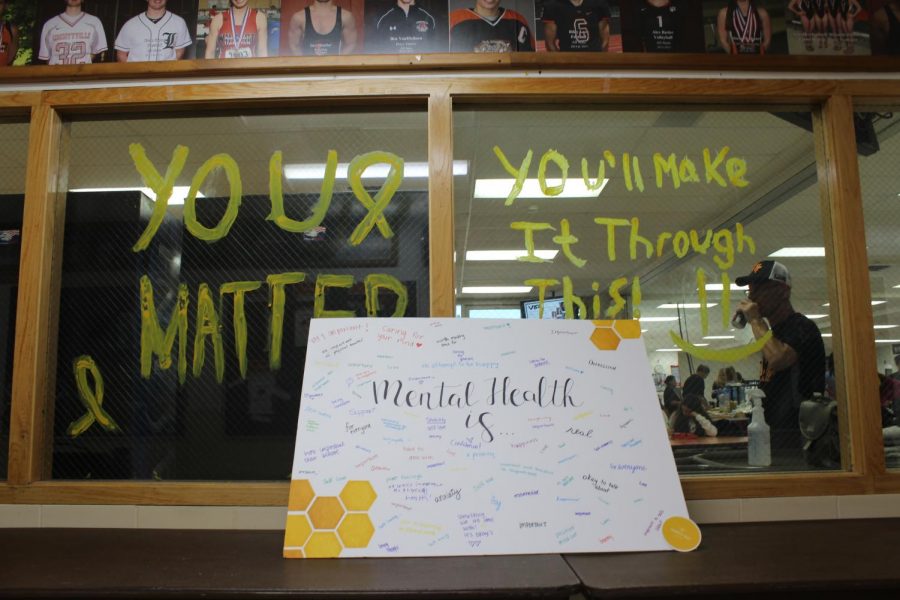LHS participates in nationwide Yellow Ribbon Week
A representative for the emotional wellness private practice organization Simply Bee visited LHS to provide information about their counseling services while students could define mental health for themselves on a poster.
In an effort to promote mental health awareness, LHS celebrated national Yellow Ribbon Week during the week of Sept. 13-17.
National Yellow Ribbon Week was preceded by the LHS-founded Self-Care Week, which focused on taking care of the individual self and prioritizing one’s personal health and was meant as an introduction to Yellow Ribbon Week.
For Self-Care Week, there was an emphasis on focusing inward, on oneself, rather than others. During lunch periods, Dr. Brenda Nelson, the school’s prevention and wellness coordinator, organized activities such as yoga and therapy dogs in the library.
Many LHS students were involved in the planning of Yellow Ribbon Week, including helping to organize spirit days, the scavenger hunt throughout the week and putting boxes outside the cafeteria to anonymously thank teachers or trusted adults in the school.
These activities were meant to be representative of the fact that steps to improve mental awareness don’t have to be grand gestures but rather everyday events that get people feeling involved and included.
“We’ve been doing a lot of planning, figuring out some activities that get everyone involved but also promote the message that you’re not alone, and that if you’re struggling in some way, there’s people through our school resources you can reach out to,” explained senior Grace Kraft on collaborating with Dr. Nelson throughout Yellow Ribbon Week.
According to the Yellow Ribbon Suicide Prevention Program, the movement began in 1994 after a Colorado teen died by suicide. Its goal is to spread awareness as far and extensively as possible, emphasizing the message of being open about mental health.
“[It’s] not to say that all mental health has to do with suicide, but all suicide has to do with mental health; it’s important to talk aout both,” stated Prevention and Wellness Coordinator Dr. Brenda Nelson.
At LHS, some Link Crew Leaders, sports team captains, and others around the school are choosing to speak about mental health to freshmen, teammates, and friends, respectively.
“I just thought it was important to reach out to our team because maybe when they get older they can pass on the message, and they can talk about it with their friends or who they hang out with,” expressed Kraft, a captain of the girls cross country team. “It’s also just important in terms of our sport, what we do, staying mentally healthy and trying to stay positive and also knowing that everyone has a support system around them — their captains, their coaches, [and] their teammates”
A general goal of Yellow Ribbon Week is to banish the stigma around mental health, particularly for those afraid to discuss it. Dr. Nelson stated that making it something people talk about prompts healthy discussion and communication rather than feelings of isolation.
A major development Dr. Nelson said she is pleased to see is the participation with students during Yellow Ribbon Week and an increase in those looking for ways to contribute.
“I know that Yellow Ribbon Week has been a thing around the school, celebrated around the school for a while, but since this is my last year, I really [wanted] to find a way to get involved and make it bigger and better this year,” expressed Kraft.
Dr. Nelson also clarified that this discussion about mental health doesn’t have to be grand or dramatic, but rather genuine and clear.
“The more that we don’t talk about things, the more power that they have, so if somebody is depressed or struggling with a mental health issue, in some way, the more stigma it had around it, the worse it is,” emphasized Dr. Nelson. “That’s why the de-stigmatizing effort is so important.”









